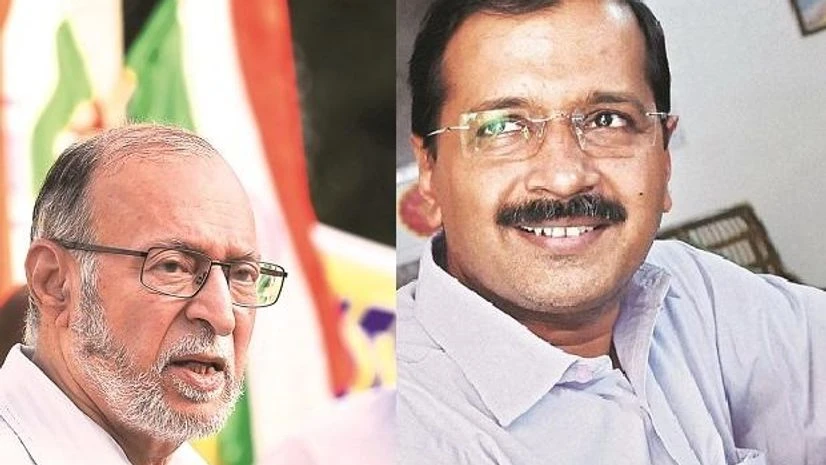In a landmark verdict, the Supreme Court on Wednesday unanimously held that Delhi cannot be accorded the status of a state but clipped the powers of the Lieutenant Governor (LG), saying he has no "independent decision making power" and has to act on the aid and advice of the elected government.
The judgement by a five-judge constitution bench headed by Chief Justice Dipak Misra laid down broad parameters for the governance of the national capital, which has witnessed a bitter power tussle between the Centre and Delhi government since the Aam Aadmi Party government came to power in 2014.
There were two LGs -- incumbent Anil Baijal and his predecessor Najeeb Jung -- with whom Chief Minister Arvind Kejriwal was on loggerheads, accusing both of them of preventing the functioning of his government at the behest of the Centre.
"It is clear as noon day that by no stretch of imagination, NCT of Delhi can be accorded the status of a State under our present constitutional scheme," CJI Misra, who penned the 237-page lead verdict for himself and on behalf of Justices A K Sikri and A M Khanwilkar, said.
"The status of NCT of Delhi is sui generis, a class apart, and the status of the Lieutenant Governor of Delhi is not that of a Governor of a State, rather he remains an Administrator, in a limited sense, working with the designation of LG," the verdict said.
Observing that the Constitution was "constructive", it also made it clear that "there is no room for absolutism. There is no space for anarchy."
The verdict answered contentious issues involving interpretation of Article 239 AA dealing with the powers and the status of Delhi, which would now be considered by a bench of 2 or 3 judges to adjudicate the matters on which there was a tug of war between the Delhi government and the Centre.
The bench, which expressed its opinion on the constitutional provisions referred to it by its smaller bench, said now the batch of appeals arising out of the August 4, 2016 verdict of Delhi High Court, in which it was held that LG was the administrative head, would come up before an "appropriate regular bench".
More From This Section
It held that though the LG was nota"titular head", he should not emerge as an "adversary having a hostile attitude" towards the Council of Ministers but rather act as a facilitator.
The differences of opinion between the LG and the Council of Ministers should have a "sound rationale" and there should be no exposition of the "phenomenon of an obstructionist".
"The LG has not been entrusted with any independent decision-making power. He has to either act on the 'aid and advice' of council of ministers or he is bound to implement the decision taken by the President on a reference being made by him," the court said.
It also held that the LG should not act in a "mechanical manner" without due application of mind so as to refer every decision of the Council of Ministers to the President. "The LG and the council of ministers must attempt to settle any point of difference by way of discussion and dialogue," it said.
The bench made it clear that though the decisions of the Council of Ministers must be communicated to the LG, it did not mean that his concurrence was required in every case.
Referring to the Transaction of Business of the Government of NCT of Delhi Rules, 1993, the court said this suggested that the LG must work "harmoniously" with the ministers and not seek to "resist them every step of the way".
It said that barring three issues of public order, police and land, the Delhi Legislative Assembly had powers to make laws on all other subjects and govern.
Justice D Y Chandrachud, who wrote a 175-page separate concurring verdict, said the LG must keep in mind that it is the Council of Ministers which takes substantive decisions.
"The LG must bear in mind that it is not he, but the council of ministers which takes substantive decisions and even when he invokes the proviso, the LG has to abide by the decision of the President," he said.
He also held that the provisions of Article 239 AA(4) must be operated and applied in a manner which facilitates and does not "obstruct" the governance in Delhi.
Justice Ashok Bhushan, who also wrote a 123-page concurring judgement, said as the Delhi Legislative Assembly represents the elected representatives, "their opinion and decisions have to be respected in all cases, except where LG decides to make a reference to the President".
For the Executive decisions taken by the Council of Ministers or Ministers, the "proviso to subclause (4) gives adequate safeguard empowering the LG to make a reference to the President in the event there is difference of opinion between decisions of the Ministers and the LG," but the constitutional scheme does not suggest that decisions by the Council or the Ministers "require any concurrence of the LG," he said.
The CJI referred to concept of 'aid and advice' and said if a well-deliberated and legitimate decision of council of ministers was not given effect due to "an attitude to differ" on LG's part, the concept of collective responsibility would stand negated.
"As opposed to centralism, a balanced federal structure mandates that the Union does not usurp all powers and the States enjoy freedom without any unsolicited interference from the Central Government," the bench said.

)
